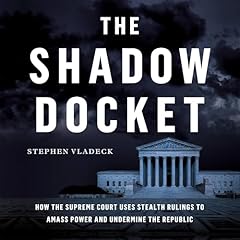
Scorpions
The Battles and Triumphs of FDR's Great Supreme Court Justices
No se pudo agregar al carrito
Solo puedes tener X títulos en el carrito para realizar el pago.
Add to Cart failed.
Por favor prueba de nuevo más tarde
Error al Agregar a Lista de Deseos.
Por favor prueba de nuevo más tarde
Error al eliminar de la lista de deseos.
Por favor prueba de nuevo más tarde
Error al añadir a tu biblioteca
Por favor intenta de nuevo
Error al seguir el podcast
Intenta nuevamente
Error al dejar de seguir el podcast
Intenta nuevamente
 Exclusivo para miembros Prime: ¿Nuevo en Audible? Obtén 2 audiolibros gratis con tu prueba.
Exclusivo para miembros Prime: ¿Nuevo en Audible? Obtén 2 audiolibros gratis con tu prueba.
Elige 1 audiolibro al mes de nuestra inigualable colección.
Acceso ilimitado a nuestro catálogo de más de 150,000 audiolibros y podcasts.
Accede a ofertas y descuentos exclusivos.
Premium Plus se renueva automáticamente por $14.95 al mes después de 30 días. Cancela en cualquier momento.
Compra ahora por $28.79
-
Narrado por:
-
Cotter Smith
-
De:
-
Noah Feldman
Four more different men could hardly be imagined. Yet they had certain things in common. Each was a self-made man who came from humble beginnings on the edge of poverty. Each had driving ambition and a will to succeed. Each was, in his own way, a genius.
They began as close allies and friends of FDR, but the quest to shape a new Constitution led them to competition and sometimes outright warfare. Scorpians tells the story of these four great justices: their relationship with Roosevelt, with each other, and with the turbulent world of the Great Depression, World War II, and the Cold War. It also serves as a history of the modern Constitution itself.
Los oyentes también disfrutaron:




















Las personas que vieron esto también vieron:








Informative and entertaining
Se ha producido un error. Vuelve a intentarlo dentro de unos minutos.
The story of how America's longest-serving president changed the Supreme Court, the country and the world with his appointments. This provides great context for understanding the rise of liberalism, judicial activism and, conversely, judicial restraint on the Supreme Court.
It's easy to forget that Justices are actual people, who evolve. But this book injects the humanity of these men, and their contemporaries, to provide a broader context that is often missing when one simply studies the opinions of the Court, as some continuous institution.
Rough start, but strong overall
Se ha producido un error. Vuelve a intentarlo dentro de unos minutos.
Great Book
Se ha producido un error. Vuelve a intentarlo dentro de unos minutos.
What did you like best about this story?
This is a fascinating journey through the history of 20th century American jurisprudence. Listeners will learn how FDR met Felix Frankfurter, Hugo Black, Robert Jackson and William O. Douglas in the course of his political career. Those four men set the Court on a path that changed the law -- before they even became justices. Great history lessons here. Very approachable; law degree not required.How FDR's created the modern Supreme Court
Se ha producido un error. Vuelve a intentarlo dentro de unos minutos.
I liked that he explained the different approaches to constitutional law, the crucial components of a number of important cases of the era, and included the political vectors affecting the court. This is a rich history and compelling "read".
He does a wonderful job as a narrator, too. I wish every non-fiction audiobook were read with such ease, simplicity, and complete lack of hype. Congratulations Noah Feldman!
Fascinating and Compelling
Se ha producido un error. Vuelve a intentarlo dentro de unos minutos.


